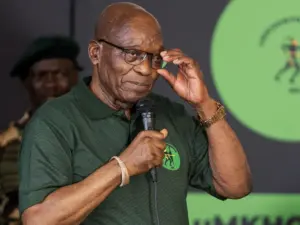By: Mphumzi Mdekazi and Babu Owino
Believe it or not, the African continent usually picks its political strength from South Africa’s leadership. When South Africa is weak, it replicates across the Continent.
Who will lead in this direction? Is South Africa failing as a pioneer strong state?
In the Federalist Paper no 51, one of America’s founding fathers, Alexander Hamilton, wrote:
“If men were angels, no government would be necessary. If angels were to govern men, no checks and balances on government would be necessary. In framing a government which is to be administered by men over men, the great difficulty lies in this: you must first enable the government to control the governed, and in the next place oblige it to control itself.”
Enabling the government to control the governed means building a STRONG STATE. Obliging the government to limit itself means instituting control of government by the rule of law and democratic Accountability.
Hamilton is saying you need a strong capable government with a competent bureaucracy well conceptualized, well structured, anchored in good law, staffed with technically qualified experts, well funded with a good appraisal system to ensure basic service delivery to the citizens is optimal.
By the time the colonialists stepped foot into Africa, most European Nations had already built strong capable States.
This evolved from years and years of long-drawn war beginning with the Hurbsbag’s attempt at European hegemony and was consolidated by the French Revolution in the state that was thereafter built by Napoleon Bonaparte.
Nations around France would then succumb to Napoleon’s conquest and those that resisted later copied the Napoleonic state and its code civilis.
Having watched the dangers of extremely strong states with no limitations on them, at the beginning of the 20th century, the debate in global politics was on how to constrain and limit the powers of rogue but strong states.
Hence, African states were born in the first half of the 20th century when institutions of constraint and limitation, such as the rule of law and democratic accountability, were the main concerns of dominant powers.
Colonial masters were no longer building strong states. They had them already in place.
In their colonial advent, preoccupied with constraining strong states, they neglected the difficult task of building strong states and rather attempted to establish some skeleton legislative councils and Judicial Administrations.
Some scholars argue that the colonialists undermined and disrupted Africa’s traditional political systems and then left before building alternative institutions. At their departure, our independence fathers were left with the tough work of nation-building (most African peoples had band, clan, and tribe-level political organizations but not state-level engagements) and state-building, which are very different concepts.
So, whether authoritarian or democratic, what most European powers had, which some regions like Asia were struggling to build and Africa lacked completely, were STRONG capable States.
THE MEASURES OF STATE STRENGTH:
The strength of a state is measured not by how Democratic or Authoritarian it is but by whether it has the capacity to protect lives and deliver services to the citizens. Its ability to govern.
Whether it can protect lives and properties, enforce law and order, and defend human rights/fundamental freedoms/civic liberties.
It is also measured by the ability of the government to build a conducive environment for citizens to engage in wealth creation.
The government must also have the ability to regulate the economy and other facets of social engagement to minimize exploitation, and inequality and to assure food and service security.
The World Bank outlines the following as measures of state strength:
1. Ability to enforce territorial integrity by military strength.
2. Capacity to secure lives and protect property by enforcing law and order by a strong police service and competent Judiciary.
3. Capacity to collect adequate tax revenue to fund government programmes through a strong Revenue Authority and a well-thought-out tax code.
4. Ability to undertake and complete Mega Infrastructural projects.
5. Ability to control/suppress corruption.
6. Ability to regulate the economy effectively to minimize exploitation and inequality.
States come into place either by Democratic(electoral) or Authoritarian(revolutionary) means, hence we can have:
1. Democratic(Elected) States
2. Authoritarian(Revolutionary/Heriditary) States.
Similarly, a state whether Democratic or Authoritarian can be either strong or weak.
There will exist four scenarios with in-betweens:
1. A state that is both strong and Democratic e.g. the US, UK, France, and Belgium.
We call them Strong Democracies. They deliver both good economic growth as well as freedom.
2. There can be a state that is Strong but Authoritarian e.g. Russia, Singapore, China, Saudi Arabia, and UAE.
These states deliver excellent economic growth but they suppress freedom and limit human rights.
We call them the Strong Authoritarian States.
3. There are Weak but Democratic states like India, Kenya, and South Africa. These states foster freedom and Democratic institutions but are incapable of delivering great services and good economic growth.
We call them Weak Democracies.
4. Similarly, there are states that do not deliver economic growth and suppress freedom such as Somalia, Ethiopia, Sudan, and Guinea Bissau.
They are largely military juntas and are called Weak Authoritarian States.
State capacities are both military and administrative/bureaucratic.
What enables States to protect their countries against external military aggression and deliver services to their citizens is STATE STRENGTH, not whether they are Democratic or Authoritarian.
Neoliberalism champions Strong Democracies as the ultimate panacea for our problems because they not only generate super economic growth but also expand freedom.
It is therefore based on the above context that a deeper search for South Africa’s leadership role is placed on the radar. It is because Socio-Political stability is a quality hard to acquire in African governments, and often fleeting once obtained. Politicians once taking office can hijack a democratic system, turning the country into a ‘paper democracy’ that has democratic institutions like constitutionally elected executives, judiciary, and legislatures but in fact, is an autocracy whose governance institutions serve the head of state.
These fragile “stabilities” are also relatively problematic factors in the governance of Africa, given the glaring lack of human development progress, with specific reference to high levels of hunger, poverty, and high levels of corruption versus the unmatched wealth African countries produce.
Belying the suggestion that socio-political stability is easier to achieve in countries with small populations is the presence of Ghana on the list for example. (Populous South Africa ranked number six on ACBR’s country ranking for socio-political stability, given the recent “insurrection”) in KwaZulu-Natal Province.
The underlying factor that has created a foundation of “stability” on which these nations have been built is a serious Will by the citizenry and their elected representatives to “sustain” democratic institutions and processes.
Mauritius comes to mind, as they lurched from one political crisis to another until its road to Damascus moment in the 1990s when the island’s leaders and people chose to pursue a democratic path as a means to achieve economic advancement. The dedication has paid off handsomely, and Mauritius is poised to acquire Africa’s first developed economy within a few years.
Another island nation, Cape Verde an additional example and has shown equal commitment to socio-political stability, and has been rewarded as the African location most Googled on the internet for holiday enquiries, as the country’s peaceful reputation spreads globally.
As mentioned, the people of Botswana have never varied from their commitment to a strong democracy, which has led to over 50 years of socio-political stability that is the envy of many other African countries, as a shining example. A quarter century after Botswana was established, Namibia was born in 1990 with a constitution pledged to the empowerment of democratic institutions beyond the ambitions of any leader. Namibians have stayed the course of that pledge, as another shining example.
However, it will be foolhardy not to look at what juncture did SA lose its African political influence and how is it currently losing that political strength to extend its influence towards the entire continent.
Domestically, SA remains vulnerable and its enemies are using that. Mosad, CIA, and M16 are deeply entrenched and are influencing SA’s political direction. Corruption and lack of ethical leadership are also costing SA in the African perception index.
Anatomically, what’s of major concern is the country’s domestic and international intelligence services which are at the lowest ebb, weak, and infiltrated. This is a source of how SA is losing its influence.
Now, without being nostalgic, it is nevertheless true that during Mbeki’s renaissance era, SA’s intelligence services were very powerful and on constant high alert all the time. SA was an asset that benefited the entire continent and SA’s perception index was on the rise in Africa due to that strong intelligence services.
Many coups and assassinations of prominent African figures were averted by SA’s intelligence leadership. Many countries transplanted that mode as they were inspired by SA’s political intelligence strength. With weak intelligence services, SA will lose almost both domestic and global battles. In fact, those battles are already in motion and have long begun.
In the absence of strong leadership in Nigeria, Senegal, and Egypt’s failure to be a leading voice for Africa, and with no strong AU leadership to talk about, SA has tried to provide leadership and represent the Continent’s interests somewhat, but that is not enough.
SA peacekeeping forces in DRC, for example, is another indication of its dying strides of strong leadership because the war in the DRC is escalating, even if it places it on opposing sides to Rwanda and Morocco who are under the influence of the West.
There is enormous pressure from the US, Israel, Germany, and the UK on African countries to isolate South Africa in the wake of the ICJ ruling on Gaza. Attempts to divide and destabilize the country politically and economically have begun and will intensify in the coming months of this election year. Arising from the above:
Is SA’s current intelligence services equal to the task? Only time will tell, as this is where everything will be determined. Intelligence service will be the battleground.
Fortunately, South Africa has strong allies within BRICS to resist some of these maneuvers. However, it is not clear how BRICS is with both its United Military wing and Intelligence wing to counter global imbalance.
Arising from the above, South Africa has to be vigilant, it should also be aware that the African continent is looking up to it, to provide visionary leadership, consistently.
The question is: What does South Africa need to re-lead, pioneer, and reclaim its leadership role in the African Continent? Because Africa must rise after all
*Mphumzi Mdekazi is a PhD Candidate at Stellenbosch University & Dr Babu Owino from the Kenyan Parliament.








To my personal point of view as Africans we must consider the fact of going back to our roots. Our leadership in Government including Traditional leaders must work together with communities in addressing the of (AMASIKO ETHU SIHLONIPHA Ubuntu bethu amasiko ethu which they to our life.)